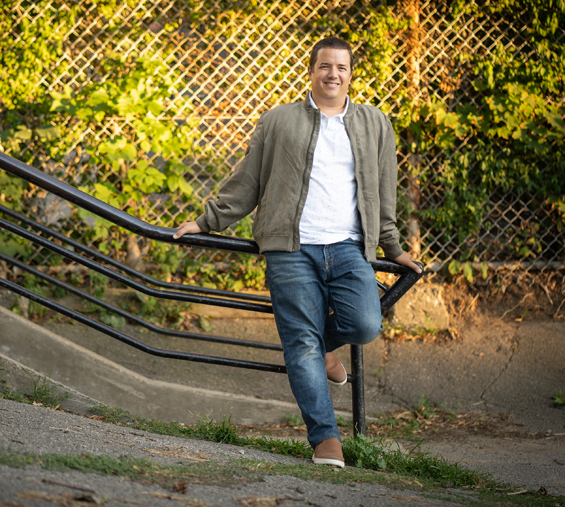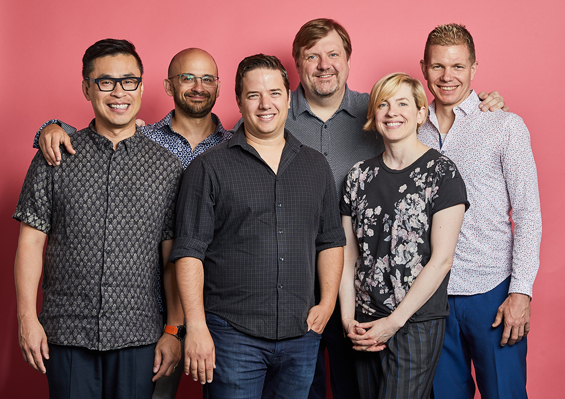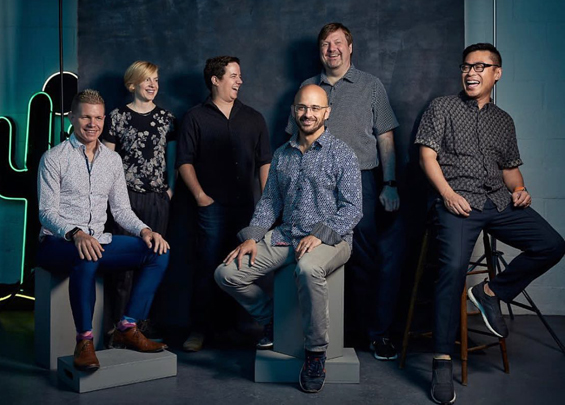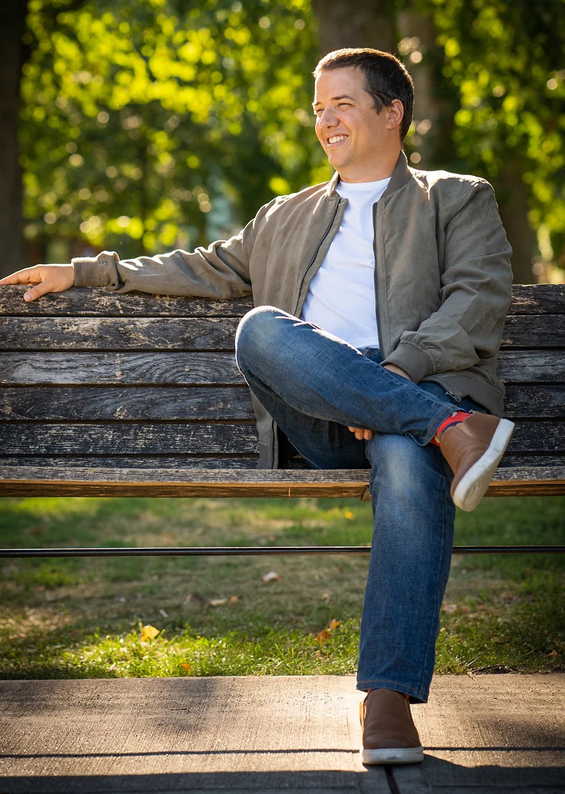

photo: Ernesto Cervini
TEN QUESTIONS WITH ERNESTO CERVINI
Drummer, bandleader, publicist, educator—a mere sampling of the many hats worn by Ernesto Cervini, who when not promoting the best jazz artists Canada has to offer is either teaching students privately and at the University of Toronto or busy fronting his own groups Turboprop, TuneTown, and Tetrahedron and playing in other artists' bands. Such a schedule might be back-breaking for most, but the inexhaustible Cervini somehow squeezes it all in. Growing up in Toronto, this future JUNO award winner (for his Turboprop release Abundance) graduated from the Royal Conservatory of Music (majoring in classical piano and clarinet performance) before shifting his focus to drums, acquiring his bachelor's degree at the University of Toronto and then a master's at the Manhattan School of Music. Upon returning to Toronto in 2007, he began imposing himself on the jazz scene as a player and publicist and releasing a string of stellar albums, including his latest, Turboprop's A Canadian Songbook (reviewed here). textura recently caught up with the drummer to discuss the new recording and the many other projects with which he's involved.
1. While A Canadian Songbook is the latest Turboprop recording, it was preceded by 2018's Abundance, 2017's Rev, and the self-titled debut that initiated the band in 2015. Impressively, the line-up has been the same on all four releases, with you joined by alto saxophonist Tara Davidson, tenor saxophonist Joel Frahm, trombonist William Carn, pianist Adrean Farrugia, and bassist Dan Loomis. What effect has that continuity had on the band, with respect to performance and your writing for it. Secondly, could you say a few words about what each of your partners brings to the group and the rapport that's developed between the members?
I feel like I got pretty lucky when I put this group together. I knew that the core quartet of Frahm, Farrugia, and Loomis would work, as we'd already recorded and toured together for five years. The addition of William and Tara was one that I thought about for a while. I've been playing with Tara since I was twelve years old, and I thought she would be a wonderful balance to Joel up front. William and I had played together on and off for about five years, and I knew he was an excellent trombonist and a wonderful guy. The band gelled immediately, and we've been having a blast making music ever since.
It's such an honour and privilege to have a longstanding band like this as I'm able to craft my compositions and arrangements specifically for these musicians and always hear their voices as I'm writing and arranging the music. In addition, even though we're all spread across North America (Joel's in Nashville, Adrean lives in Nova Scotia, and Dan's in Brooklyn), we have instant rapport and chemistry when we reconvene on stage or on tour.

photo: Ernesto Cervini (William Carn, Adrean Farrugia, Ernesto Cervini, Joel Frahm, Tara Davidson, Dan Loomis)
2. Let's talk in detail about A Canadian Songbook. I'll confess that when I first heard the title I thought it would be an all-covers release whose set-list might feature songs by bands such as Blue Rodeo, The Tragically Hip, The Band, The Barenaked Ladies, and Rush, and and solo artists like Neil Young, Joni Mitchell, Gordon Lightfoot, Sarah McLachlan, and others. Even though the album you're releasing does qualify as a Canadian songbook, it's a mix of covers and originals. Could you talk a bit about what the set-list actually comprises and what led you to make the song choices you did? And what, for you, are some of the album highlights?
Well, we did cover a Barenaked Ladies song, so you were right there! The idea was to play a bunch of music by Canadians, not just pop/rock artists but also some of my colleagues in the Canadian Jazz scene. We recorded songs by Canadian pianist James Hill (BADBADNOTGOOD, Local Talent) and saxophonist Allison Au as well as Turboprop's trombonist William Carn. I thought it would be nice to celebrate the beautiful writing that's happening right now in the scene (in the same way musicians would record each other's tunes in the ‘50s). We also covered one of Our Lady Peace's biggest hits, “Clumsy,” and the aforementioned BNL tune, “When I Fall.” I also sprinkled in a couple of original tunes of mine.
In terms of highlights, of course that's difficult, as they're all my babies! But, if forced to, I'd say that I really love the BNL cover. There's something about playing a slow 6/4 groove that makes me so happy. William plays a gorgeous intro solo, Dan executes the melody flawlessly, and Joel takes us to church with a soulful solo!

3. Turboprop recorded the material for A Canadian Songbook across two sessions, one in March 2022 and the other in December of the same year. Apparently, four or five songs were also recorded that didn't make it onto the album and that will likely appear on the group's next release. Any clues as to what those songs are and who they're by?
Sure, I'd be happy to share that! We recorded a version of the Radiohead song “Present Tense” that we've been performing for the last couple of years and a song by NYC-based guitarist Nir Felder titled “Bandits.” We also recorded a song by our alto saxophonist Tara Davidson, a couple of originals of mine, and an Ornette Coleman tune. I'm not 100% that those ones will make it onto the next album, but we'll see!
4. You're comfortably ensconced in Toronto where you were born and grew up, but after finishing your undergraduate degree at the University of Toronto you moved to New York in 2003 to earn your Master's degree at the Manhattan School of Music. What impact did that out-of-country experience have on you as a person and musician?
Those years were perhaps the most important of my life, both personally and musically. It was my first time away from home (although I did live on campus while attending the University of Toronto) so I was really forced to grow up and I learned a ton about myself and how best to succeed. It was also a period of incredible growth as a musician. When I arrived in New York, I was immediately inspired by the incredible talent and drive of the musicians I met, and that feeling continued the whole time I lived there. I believe living in NYC for four years did a lot to shape the musician and human that I am today.
5. A decade on from the founding of Orange Grove Publicity, is the company today where you envisioned or hoped it would be or has it exceeded expectations? And are there particular moments that stand out from that ten-year period as particular highlights, be it an award, release, or otherwise, or as accomplishments of which you're most proud?
To be perfectly honest, I never envisioned anything like this at all. Orange Grove Publicity started quite innocently and organically; there was a group of musicians that were looking for a jazz-focused publicist, and I commented that I thought it was something I could do. Soon after that, somebody hired me, and I was off and running! Things started slowly, but through the last decade, the business has grown way beyond what I could have imagined. At this point, we work with around forty album releases a year, with clients from all across Canada, and some from the US. I guess a high point would be the first time we had clients nominated for Juno Awards—that's always a thrill!

photo: Ernesto Cervini
6. Continuing on with questions about Orange Grove Publicity, how do you go about selecting the releases that you promote through the company and determine the release schedule? Are these decisions made with others or are they exclusively your call?
I'm happy to work with all artists, provided the music is something I believe I can get good results for. The music has to fit the “vibe” of the company, has to be at a certain level, and fit under the wide umbrella of jazz. This decision is mine alone, although I do sometimes consult with my right-hand man, Dan Fortin (also an incredible bassist with whom I love to play). The release schedule is something that's discussed between me and the artists. I generally try and work around the artist's timeline.
7. You've clearly been playing drums for a long time and not only play but teach others on the instrument too. While Modern Drummer described your drumming as being “in the spirit of Art Blakey and Billy Higgins,” I'm curious as to how you see your own playing—your “drumming philosophy,” as it were—and how you believe it's evolved over time.
I strive to be a musical and supportive drummer. My goal on the instrument is to make everybody in the band feel great about their own playing, and therefore lift the performance of the whole band. I think this has always been a goal of mine, but it became far easier to accomplish as I've become more confident and gained more facility on the instrument. I'm always striving to “stay out of my head” and stay present in the music that is being made on stage.
8. In being so much at the centre of what's happening in the Canadian jazz community, you clearly have an informed take on the current jazz scene in this country. What's your assessment of its current condition, and how well do you think it holds up compared to the one that preceded yours?
I think the Canadian jazz scene is in great shape! There are new musicians emerging all the time from all corners of Canada, and I'm so excited with the way the music is evolving and growing. I hope that this growth continues and that the incredible funding that has been available as I've emerged in the scene continues to exist at all levels of government. In terms of how this holds up against past iterations, that's hard to say, but I can say that I'm very glad we've emerged from the “old boys club” of yesteryears. It's such a pleasure to make music with many different people with diverse backgrounds and different approaches. I think this makes the music richer!

photo: Ernesto Cervini
9. In addition to running Orange Grove Publicity and playing in a number of bands, you're also a drum instructor at the University of Toronto and a guest lecturer in jazz business courses at Humber College and York University. To juggle all of that requires an incredible amount of time and energy so, simply, how do you do it? And while so much of your energy is being consumed by what's immediately in front of you, do you have specific goals in mind for the future?
Ha, how do I do it? I don't know! One of my focuses is to stay really organized and stay present in what I'm doing at any given time (which is much easier said than done.) It does require a certain amount of discipline to make sure I'm staying focused and don't get distracted by the sheer volume of activities that I do on a daily basis (being a parent on top of it all!). I definitely always have an eye on the future and future goals. I'm already thinking of the next Turboprop album I'd like to record and release, although that likely won't be for a couple of years. I'd desperately like to take Turboprop to festivals across North America and also to Europe! That's a dream of mine.
10. I'm guessing what little time you have for pure listening goes to the material being readied for release through Orange Grove and deciding on the release schedule. But when you do have a chance to listen to music that's not work-related, what do you enjoy listening to?
I listen to a ton of different music. I do take the subway to and from University of Toronto twice a week, so I get some good listening done then. I'm a huge fan of Radiohead (I play in Canada's finest Radiohead tribute band, Idioteque) and also The Smile (which features Thom Yorke and Johnny Greenwood with jazz/rock drummer Tom Skinner.) They have a new album that just came out, and I've been listening to that a ton. I love listening to jazz as well (obviously) and have been listening to Mark Guiliana's latest album quite a bit. I also tend to be a very nostalgic listener, so I have playlists that I listen to containing music that I've been listening to since I was a teenager!
website: ERNESTO CERVINIMarch 2024![]()